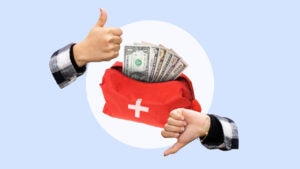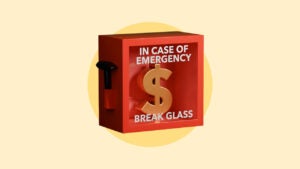5 ways to get an emergency loan with bad credit

Key takeaways
- Emergency loans for bad credit tend to have higher interest rates and fees than traditional loans.
- Payday alternative loans and credit card cash advances are emergency loan options available to most borrowers — even with imperfect credit.
- Payday and title loans are also options, but these are much more likely to be predatory and should be avoided whenever possible.
If you have less-than-perfect credit, you’ll generally have to look beyond traditional personal loans to get the help you need when you’re faced with an unexpected expense.
Though loans for bad credit are available, they come with higher interest rates and fees than other loans. Weigh the pros and cons of each option before applying to avoid any financial headaches down the line.
Types of emergency loans for bad credit
The types of emergency loans for bad credit usually come with higher-than-average interest rates and low funding limits. These options are designed for borrowers who need fast funding for an unexpected bill or expense. Short repayment terms are also quite common, though there are some exceptions.
| Loan type | Loan amount | Repayment term | APR | Who it’s good for |
|---|---|---|---|---|
| Bad credit personal loans | Up to $50,000 | 3-7 years | Up to 36% | Borrowers with poor credit who meet other eligibility requirements |
| Payday alternative loans | Up to $2,000 | 1-12 months | Up to 28% | Credit union members in a pinch who need to borrow a small amount. |
| Credit card cash advances | 20% to 30% of the available credit limit | Until the balance is paid off | Close to 30% | Cardholders who need quick cash and can afford to pay off their balance quickly. |
| Payday loans | Up to $500 | 10-14 days | 300% and up | Borrowers who don’t qualify for a loan anywhere else and are confident they can repay the loan quickly. |
| Title loans | 25% to 50% of your vehicle’s value | 2-4 weeks | Typically three figures but varies by state | Borrowers who need the funds urgently and lack other options to borrow money. |
Bad credit personal loans
Consumers who can’t get a lower interest rate on other forms of borrowing and are confident they can repay the debt on time or, ideally, ahead of schedule.
Bad credit personal loans are offered by many of the same banks, credit unions and online lenders that advertise personal loans — and they are repaid in installments over three to seven years. However, if you don’t have good credit, expect to face higher interest rates and origination fees. These combine to create your annual percentage rate (APR), and it can approach credit card levels, with even reputable lenders capping rates at 35.99%.
If you have an urgent need, these loans can be useful based on their funding speed. Just be wary of the interest costs. While 35.99% is a far cry from the triple-digit surcharge on payday loans, it’s still expensive debt to own. As always, choosing the shortest term you can afford will lessen the toll of interest.
A creditworthy cosigner or co-borrower can help you qualify for a lower interest rate. Just be aware that your cosigner or co-borrower will be negatively affected if you don’t repay the debt on time. Plus, a co-borrower (unlike a cosigner) will share equal access to the loan proceeds.[

Benefits
- Unsecured loans means no risk of forfeiting collateral
- Build your credit with on-time payments
- More competitive APRs than other emergency loan options

Drawbacks
- Your APR is determined by your credit
- Origination fees are common among even reputable bad credit lenders
Payday alternative loans
Offered by select federal credit unions, payday alternative loans offer amounts of up to $2,000. These unsecured loans have repayment terms ranging from one to 12 months. Though they may be easier to get than a traditional personal loan, borrowers still might need to pass a credit check for approval.
Because interest rates tend to be based on your credit score, those with bad credit tend to get the highest rates. That said, these loans cap interest at 28%, which is lower than some credit cards and most other emergency loans. To apply, you have to be a member of a credit union that offers this loan product.

Benefits
- More competitive interest rates than payday loans
- Application fee cannot exceed $20

Drawbacks
- Credit union membership required
- Small loan amounts
Credit card cash advances
Some credit cards offer cash advances that let you pull funds from your credit line. You can visit an ATM or a bank branch to withdraw the money you need up to the cash advance limit or the available credit on your card, depending on the card issuer’s guidelines.
You will likely be charged a transaction fee, usually between 3% and 5%, to use this feature. Plus, you’ll immediately begin to accrue interest on the funds you borrow since there’s no grace period. Credit card cash advances tend to be limited to between 20% and 30% of your available credit limit.

Benefits
- Immediate access to cash
- No application or credit check required

Drawbacks
- Cash advance fee
- Higher APR and no grace period
Payday loans
Payday loans are short-term, unsecured loans that offer quick funding. Most are limited to $500 and are due within two weeks. You likely won’t need a credit check to be approved, making payday loans easily accessible to borrowers with bad credit.
That said, payday loans are not legal in every state — and states that do allow them have their own laws. You will face fees, generally between $10 to $15 for every $100 borrowed. This is the equivalent to a three-digit APR.
Not having the funds available when the loan becomes due often results in fees from your financial institution. Though you may be able to get an extension on your due date if you live in a state that allows rollovers, this usually comes at a price that can keep you trapped in a cycle of payday loan debt.

Benefits
- No credit check
- Funding as soon as a few minutes to hours

Drawbacks
- Triple-digit interest rates on some loans
- Steep fees for rollovers
- Usually doesn’t help build credit
Title loans
A title loan is secured by the title to your vehicle, which acts as collateral in exchange for a short-term loan. In most cases, you must own your car outright — not have a loan on it — and are limited to loans between 25% and 50% of your car’s value.
Like payday loans, title loans should only be used as a last resort for several reasons. You risk losing your car if you cannot keep up with payments. Even if you are able to keep up with payments, title loans also come with high interest rates and a short repayment period that could place significant strain on your budget.

Benefits
- Funds available as soon as the same day
- Often accessible without a credit check

Drawbacks
- Risk of repossession
- High borrowing costs
- Doesn’t report to the credit bureaus
How to choose which emergency loan is best for you
The right loan depends on your financial situation. Start by understanding the specifics of each option and weighing the pros and cons along with the borrowing costs to find the best fit.
If you’re a credit union member, it’s worth applying for a payday alternative loan if offered. Otherwise, a credit card cash advance could work if available since you don’t have to formally apply and the interest costs can be lower.
But if neither of these is an option, consider a payday loan. The borrowing costs are steep, but repaying the loan promptly means you avoid added fees.
If you don’t qualify and desperately need cash, try a title loan, but only as a last resort. Be sure you can afford the payments to prevent your vehicle from being seized if you default on the loan agreement.
Emergency loan alternatives
If you’d prefer not to use credit to cover an unexpected bill or urgent expense, these alternatives to emergency loans could work instead.
- Get help from a charity or local nonprofit: Call 211 to learn more about financial resources available in your local area or through your state.
- Request a paycheck advance: If you’ve been at your job for a while, ask your employer for an advance on your next paycheck.
- Ask a friend or relative for a loan: They may be willing to give you an interest-free loan, but be sure to put the agreement in writing.
- Make payment arrangements: If you need fast cash to cover monthly debt obligations, contact the lender or creditor and ask for an extension.
- Borrow from your 401(k): Some 401(k) plans permit loans of up to $50,000 or 50% of the vested balance — whichever is lower — and the interest you pay goes back into your account. Keep in mind that this route could impact your retirement savings as there is a large tax deduction when borrowing from your 401(k).
Bottom line
Although you are able to get an emergency loan with bad credit, you should turn to alternatives first. Local hardship programs, family and friends or a paycheck advance can help you meet emergency expenses without paying interest.
If you do need to borrow, compare options carefully. Find a lender that offers fair rates at a monthly payment you can afford. Emergency loans for bad credit can be helpful in a pinch, but they should be considered carefully to protect your credit and financial wellbeing.
Why we ask for feedback Your feedback helps us improve our content and services. It takes less than a minute to complete.
Your responses are anonymous and will only be used for improving our website.
You may also like

How to get an $80,000 personal loan

What are the pros and cons of emergency loans?

5 tips for paying unexpected or unplanned expenses

How to get an emergency loan in 5 simple steps


